According to psychotherapist Dr Bilqis Jubari, one in three Yemenis suffers from a mental disorder. Most of them are women. And while the war rages on, Jubari continues her courageous efforts to expand and improve mental health and psychosocial support (MHPSS) services, supported by donors and partners like the Dutch Embassy and Cordaid.
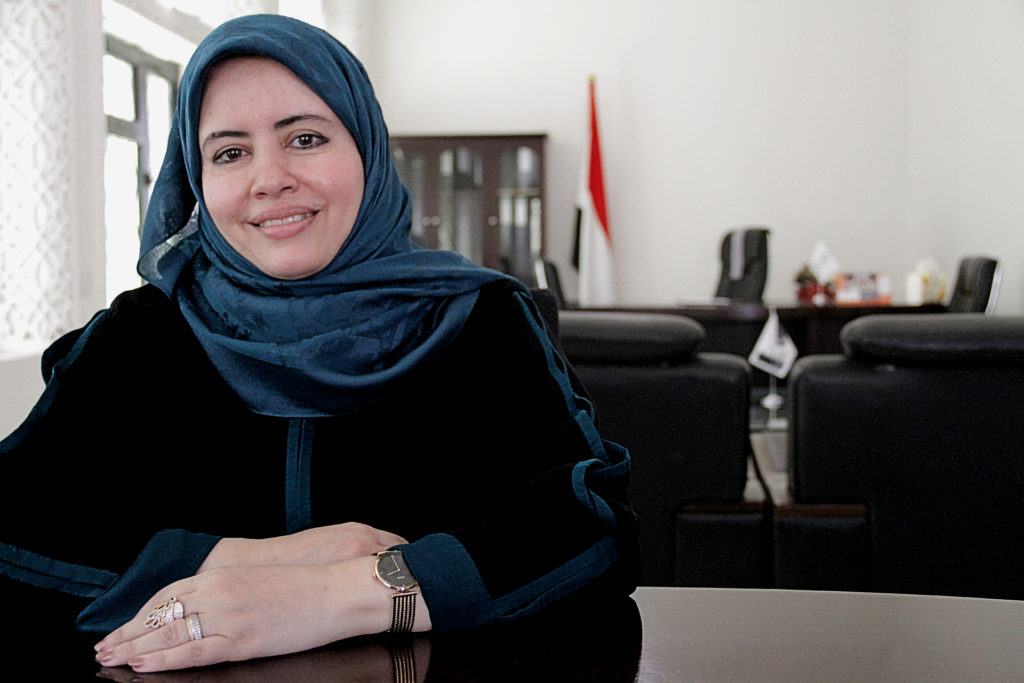
Dr Bilqis Jubari is an associate professor and psychotherapist at Sana’a University. In 2011, she was the first to set up public mental health services in Yemen. And while she and her teams in Sana’a and Aden treat everyone suffering, women and girls are their first concern. ‘But you can’t separate. If you treat a father who is mentally ill, you also alleviate the suffering of his wife and daughters,’ she says.
Ten years later, the positive impact of her pioneering work is undeniable. As is the need to do more.
Mental Health Care: Essential, Underfinanced, Neglected
COVID-19 and seven years of war have acutely aggravated psychological suffering and trauma. This increasingly damages people’s health and well-being and erodes the country’s peacebuilding and recovery efforts.
To put things into perspective, Yemen has only 46 psychiatrists, one for every 600.000 people. They can’t even cater for a fraction of the needs. In 2017, three years into the war, UNFPA estimated that 11.3 million Yemeni people (30% of the population) need protection, and 2.6 million women and girls are at risk of gender-based violence. In the same year, the Family Counselling and Development Foundation (FCDF), founded by Dr. Jubari, pointed out that one in five Yemenis suffered from mental health disorders. Four years on, the suffering has only increased. Today, she thinks it’s one in three.
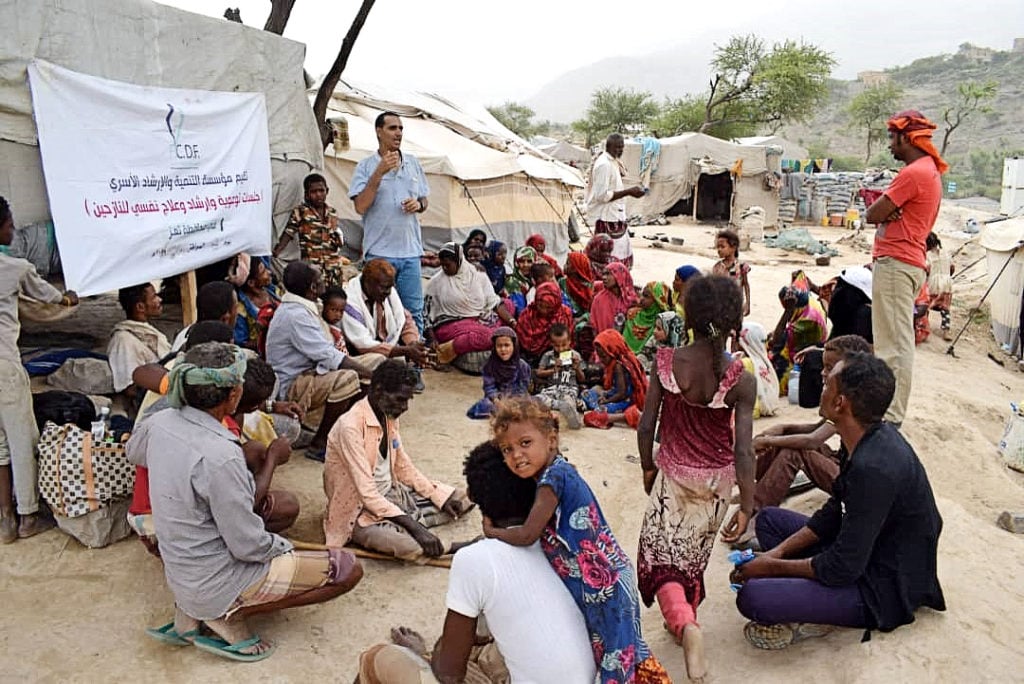
Despite the pioneering work of Dr Jubari, mental health and psychosocial support remain underfinanced and neglected areas of public health in Yemen. Yet, with the support of donors and partners like the Dutch Embassy and Cordaid, she continues her courageous efforts to expand and improve MHPSS services while the war rages on.
‘From birth to death, fathers, brothers, and other close male relatives control the lives of women.’
In the run-up to a Yemen conference that Cordaid hosted in December, and where Dr Jubari was a keynote speaker, we had an in-depth interview with her.
Dr Jubari, can you describe the scope of the humanitarian crisis in Yemen?
‘It affects all aspects of life, for everyone, and undermines all public and private structures and institutions. The suffering increases every single day. Millions of people haven’t been paid a salary for 5 years. Youth unemployment has reached 65%. Inflation and prices of basic commodities are skyrocketing. 82% of our people are living below the poverty line. One in three persons has a mental health disorder. Maternal and child healthcare is on the brink of collapse. Do I need to continue?’
You work a lot with women and girls. How are they affected differently from men and boys?
‘Women and girls structurally suffer from the inequality and the male domination that is part of a deeply conservative and tribal culture. This has been the case long before the war started seven years ago. From birth to death, fathers, brothers, and other close male relatives control the lives of women. This control comes with a whole spectrum of violence and deprivations. Forced early marriage, polygamy, no access to education, work, or property. No inheritance rights. Physical and mental abuse.
A mother or grown-up sister must obey a 13-year-old son or brother. For a man, it takes one word to end his marriage. It takes an impressive amount of legal effort for a woman to get a divorce. Then there’s divorce shame. Her children are taken away from her, and she becomes an outcast. This gender-based discrimination is not based on religion. It is part of Yemen’s tribal culture. You don’t see that in Egypt or Jordan, for example.’
The Yemeni women in this video are doing everything in their power to improve the situation in their country and tell us more about what we need to know and do to achieve peace:
Has the war changed this?
‘Of course. Stress and poverty levels have risen to crippling levels. Frustration and anxiety among men have increased. They have no money, jobs, or means to provide for their families. This results in more male violence and more oppression. People with anger inside usually take it out on the weakest part of the chain. At home, this is the wife, the daughter, the sister. Women then become aggressive towards those who are even more vulnerable: the younger children. And kids, in their turn, suffer immensely. They pile up fear and anger and become aggressive towards each other, towards objects like the furniture. It is a chain reaction very much reinforced by the war but also by the COVID-19 crisis.
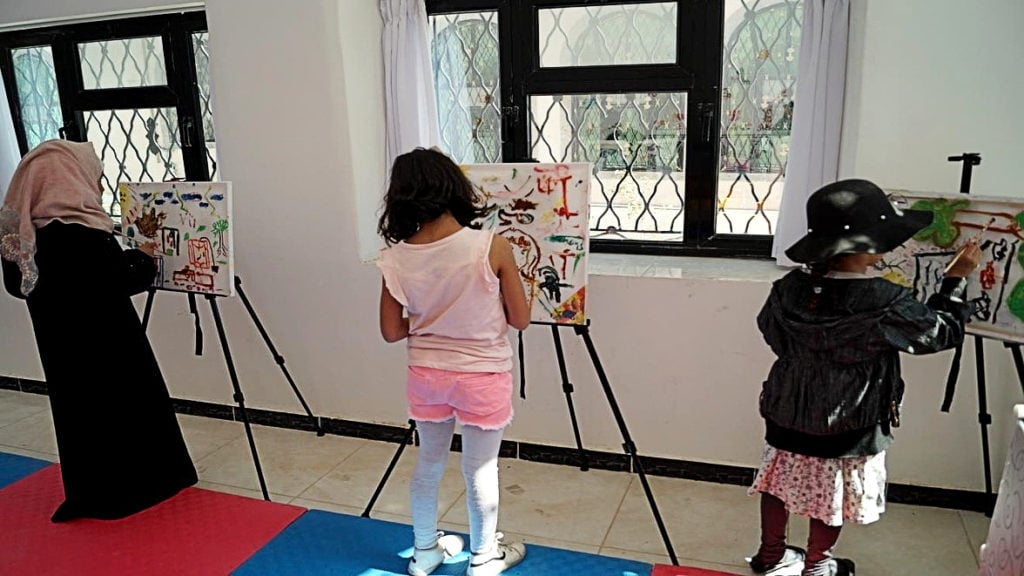
But the war and the immense crisis have also pushed men to change. More than before, men allow the women of a household to find jobs and contribute to the family income. In this crooked sense, poverty opens up opportunities and changes harmful gender patterns.’
You opened the first non-governmental mental health centre in Sana’a in 2011. Can you take us back to those first years?
‘Mental health care and psychosocial support were and still are veiled in taboos and shame. People aren’t familiar with it. If you show signs of a mental disorder, you are often sent in silence to witchcraft practitioners. So, our biggest task in those first years was to have people trust us and overcome their shame.
‘Yes, we treat patients. Yes, we prevent suicides. But it is hardly enough.’
Knocking on our doors is a big step, especially for women. Especially if you have a mental disorder. They sometimes travel hundreds of kilometres, coming from all parts of the country. All our services are free of charge, but the travel costs cut deep into their budgets. Sometimes, they have been living with their disorders and their suffering for six or ten years before coming to us. Tied up at home, with ropes, beaten up by their husbands or relatives all those years. Treating them and offering them and their family members an integrated set of support services is a long-term matter.
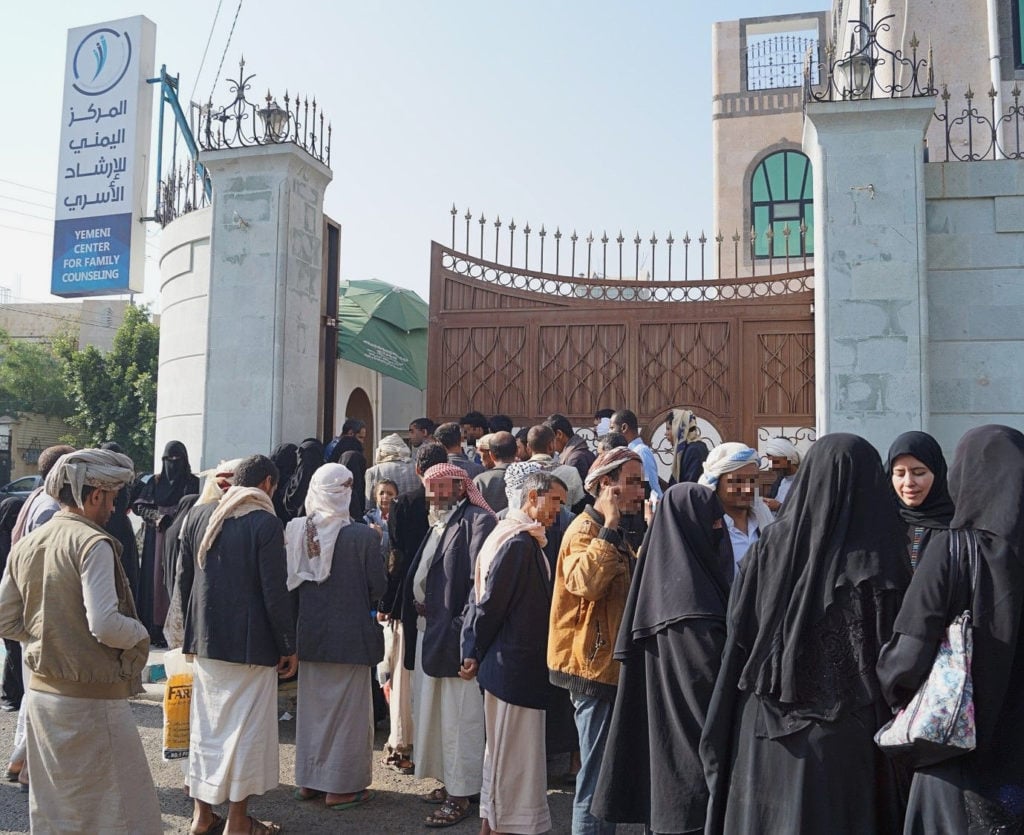
While at the start, we had a hard time finding and receiving patients, today we have waiting lists. Our trained psychiatrists, psychotherapists, and counsellors in the two biggest cities offer professional mental health services. Our psychological counselling helpline gets up to 4000 calls every month. We offer telephone counselling sessions for patients in remote areas.
‘Underneath all these layers of suffering, caused by the war, by poverty, the deepest need of Yemeni women is to be more assertive. In fact, the lack of assertiveness is the key to their suffering.’
Yes, we treat patients. Yes, we prevent suicides. But it is hardly enough. To my grief, we don’t have the means to expand and invest as much as we need to. Worse, we have medicine shortages, and funds are dwindling. We are lucky to have the Dutch government, and Cordaid also supports us. The Netherlands was the first country to support mental health care in Yemen. And it continues to do so.’
Most of the patients you treat are women. Do you also treat men?
‘Of course, 35% of our patients are men. Most are women because mental health needs among women are bigger. As is prescribed in Yemen, we have separate departments for men and women. But we look at the family as a whole. Because the whole family suffers if one member has a mental disorder. We had a male patient who was schizophrenic, for example. Our treatment helped him to feel better. But it also ended years of abuse and domestic violence. His wife told us she and the kids could finally breathe again.’
In this case, the abuse was committed by a sick man. Would you say that a culture of male domination can be a ‘cover-up’ of gender-based violence and that it normalises pathological behaviour?
‘In this case, yes. If nobody questions male control, if it is the man’s role to control, if it is ‘normal’ that he beats his wife and that a woman has to obey, then nobody will consider this behaviour as abnormal. Let alone consider it pathological behaviour or part of a disorder.’
Is that also part of the effect of your work on mental health care, that it lays bare harmful norms and helps to change society for the better?
‘We offer mental services that help individuals and their families. But we also see how our work changes people’s mindsets and changes the community. Yemen is an extremely gender-segregated society. Today, we see women accompanying their husbands to their therapy sessions, walking hand in hand, and vice versa. That was unthinkable before.
‘You cannot separate a person’s psychological suffering from the economic, social, and security crises they have to cope with.’
It is a hopeful sign. It shows that restrictive social norms can and do change and that taboos and stigma around mental health can be broken. Take the husband, who was so happy to see his wife’s changes after she was getting treatment—she was happier and stronger. At the start, he didn’t like his wife going to her therapy sessions. Later on, he encouraged her, saying that he would take care of the kids whilst she was out. In Yemen, that is a small revolution.’
You said that funding for mental health and psychosocial support in Yemen is decreasing. Yet, within the international community, mental health in conflict-affected settings is increasingly becoming a priority. This seems contradictory.
‘International donors focus primarily on humanitarian aid, shelter, and food. Mental health has recently gained more attention, but only recently. Some of our donors, not the Netherlands, have asked us to reduce our budgets by 25%.
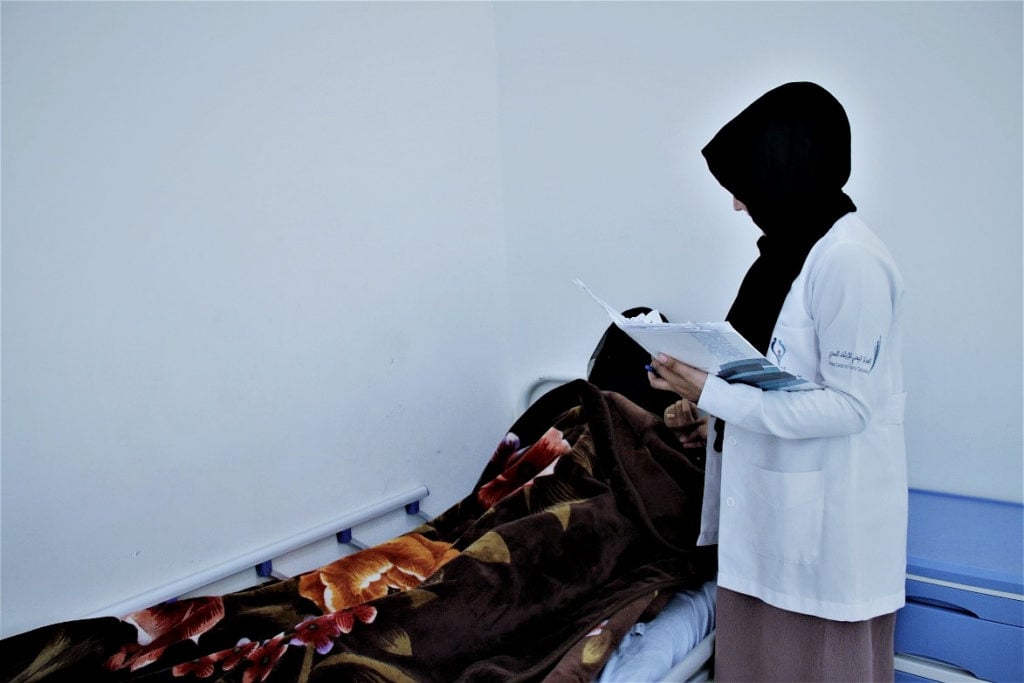
For me, investing in mental health support in a humanitarian crisis such as Yemen is as important as providing food or shelter. It should be integrated from the start. You cannot separate a person’s psychological suffering from the economic, social, and security crises they must cope with.’
Many women who seek your support come from outside the big cities and are illiterate. Is treating them differently than treating persons who are educated?
‘About 77% of the women we treat are illiterate. The disorders they show are not per se different, ranging from sleeping disorders to PTSS, depression, and other disorders.
But there is a very important difference. Women who never had the chance to go to school, get a degree, or even learn to read are less self-conscious and confident. Less assertive. Much of their suffering boils down to the fact that they are not in a position to say ‘no’. Many survivors of gender-based violence do not even know or feel they are abused. Underneath all these layers of suffering caused by the war and poverty, the deepest need of Yemeni women is to be more assertive. In fact, the lack of assertiveness is the key to their suffering.
‘We are helping men, we are reaching out to them. Either by treating them or by allowing their wives and daughters to feel safer.’
This is why treating a mental disorder is not a standalone thing but has to be part of an integrated form of support. We provide psychological and psychiatric support, but we also train her to be more assertive. We work with other training centres where they can empower themselves economically.
Before we started, in 2011, there were these GBV victim support programmes. They focused on specific forms of support, like cash assistance or legal support. It didn’t work well. You must work on all fronts simultaneously: mental health, physical health, social support, economic empowerment, and legal support. Only this is what allows women who have been abused, violated, and locked up sometimes for decades to rise again from complete collapse. In essence, what we do is liberate women from male oppression.’
If that is what you are doing, do you encounter much opposition from men, especially in leadership positions?
‘It’s not as black and white as you think. We never tell men to change their minds or behaviour. In fact, we are helping men; we are reaching out to them, either by treating them or by allowing their wives and daughters to feel safer. In the end, we help them to feel better themselves and to be better fathers and husbands.
‘If a traumatised population, like the Yemeni people, cannot address its own suffering, there will never be peace. Not inside people themselves, and not in the country as a whole.’
Take again the example of the man who suffered from schizophrenia. By treating him, we alleviated his suffering. His wife, who was a teacher, had been locked up in the house, sometimes tied with electric wires for a long time. Causing her to develop severe mental disorders like depression. Without explicitly telling someone to change harmful behaviour and challenging harmful social norms, we managed to diminish the suffering of the husband, the wife, and the children. We managed to create a family space that feels safer for all. Tit helped the wife, as she said, to finally breathe again. That’s a new setting, a starting point.
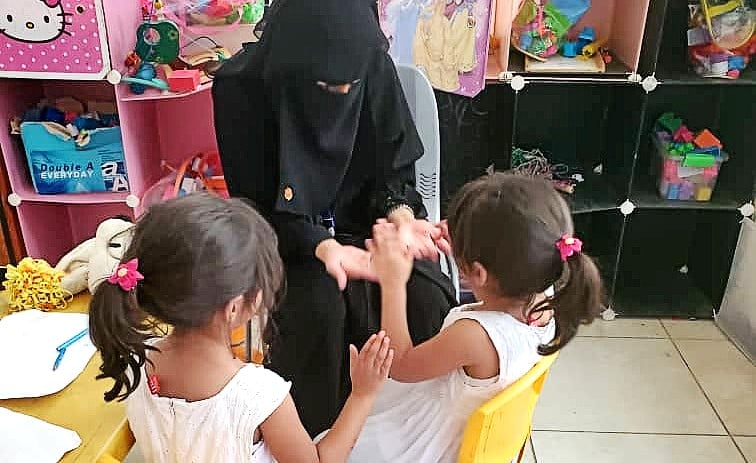
Or take the husband who changed his ideas and ended up supporting his wife going into therapy. He saw the benefits of therapy for his wife but also himself and the whole family. That’s why he started behaving differently. Not because someone tells him about the destructive effects of male control and oppression or about gender roles.’
You work in different parts of a country torn by war, dealing with different authorities and armed groups. That must be challenging. Can you say something about that?
‘I will not talk about the political conflict. The only thing I can say is that we manage to have centres in parts ruled by different powers in the conflict simply because they trust us and understand that what we do is essential. Everybody is suffering. Even the authorities send their relatives who are suffering from disorders to our centres. We build on this understanding and this recognition of our work to work our way around the complexities and insecurities of war.’
I understand you can’t say much about the political aspects of the conflict. But do you think working on mental health can contribute to peace?
‘You know, real peace is not about power or only about those in powerful positions. Peace is about all Yemenis. If a traumatised population, like the Yemeni people, cannot address its own suffering, there will never be peace—not inside people themselves and not in the country as a whole. Therefore, by providing MHPSS services, we significantly contribute to peace in Yemen.’
Working on mental health in a war-affected country constantly puts you at the centre of a lot of suffering. You have been doing that for 10 years. And that suffering, as you say, increases every day. Do you ever lose hope?
‘No. Inside of me, hope is still stronger than desperation. I have the hope and the ambition to grow. I want to duplicate our successes and have MHPSS centres in all 10 governorates of the country in 10 years, serving hundreds of thousands of people, rich and poor. Because money doesn’t protect you against mental suffering.
‘The return on investment of every euro spent on someone’s mental health is manifold.’
I want to focus more on prevention because we need to reach out to people before they have collapsed and need help. I want to train more psychiatrists and psychotherapists. To fill the huge gaps in mental health care and psychosocial support in Yemen. I don’t want to wait until the war ends to do all that. We have to do it now.
I’d love to see centres that combine all essential support services. Especially for women because they need it most. For medical support and psychological support. Where they can train and improve their professional skills. With a gym to work out, a relaxation centre, a legal support centre, and a financial service centre for women who want to start their own businesses. A whole range of professional support is easily accessible in one building. So, hope prevails.’
What do you need most from the international community and partner and donor organisations like Cordaid to turn those ambitions into realities?
‘We need continuous support instead of short-term and project-related support. Only this will allow us to plan ahead, organize our activities, and expand. We need our investors to stand with us for long periods.
My message to the international aid community would be to invest in mental health care right from the start, parallel to relief efforts, and in an integrated manner. Never separate mental health support from economic empowerment, legal assistance, and other key forms of support. It’s all connected.
Lastly, on a positive note, the return on investment of every euro spent on someone’s mental health is manifold. This euro contributes to stronger and more stable people, fewer long-term medical costs, healthier families, less suffering among family members, more income, and financial stability. It starts a chain reaction, this time in a positive sense.’
Why do you do what you do?
‘That’s a funny question. Or rather, a funny answer. I come from a well-known and well-to-do family. We were six sisters, no brothers. No male domination, no control. Six queens, no kings standing in our way. We were all able to explore our talents and have good positions. One is a surgeon, I am a professor and therapist, and others also have a Ph.D. or master’s degree.
When I was 14, I remember thinking, “I am lucky. I feel free, I can go to school, I don’t have to cover my face.” I saw my friends, many of whom did not have the same opportunities. It was then that I decided to do my best for other women who weren’t as lucky as I was. That’s how things started.’
Article and interview: Frank van Lierde
